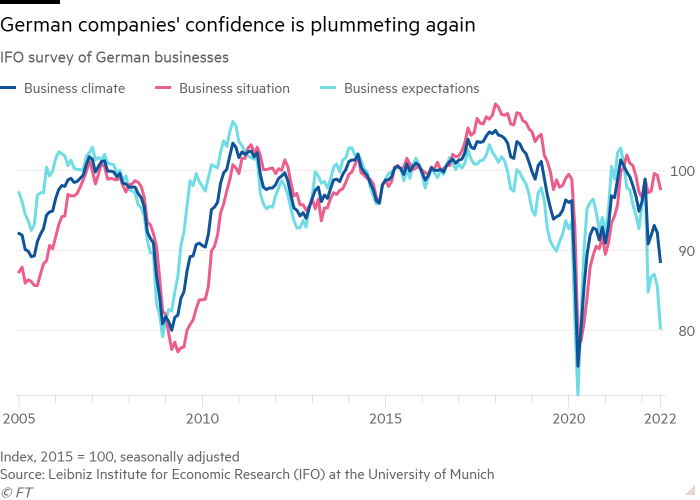German business enterprise self esteem has fallen to its most affordable stage for extra than two decades in the most up-to-date sign that Europe’s biggest financial state is teetering on the brink of economic downturn.
Organizations throughout Germany became far more gloomy about both equally their recent predicament and the outlook for the subsequent six months, according to the Ifo Institute’s carefully viewed index of small business self confidence. The believe-tank’s index this month fell to 88.6, down from 92.2 in June, marking its least expensive amount due to the fact June 2020.
Germany has been tough strike by soaring costs and the Russian gasoline crisis, which threatens to halt generation at some of the country’s industrial powerhouses about the winter season months.
Gross domestic merchandise figures for the next quarter are out on Friday and are anticipated to display German development of only .1 for every cent, according to economists polled by Reuters. The economic system grew .2 for each cent in the to start with quarter after shrinking .3 for each cent in the final 3 months of 2021.
The Ifo success were even worse than envisioned by economists polled by Reuters, who on typical forecast the index would fall to 90.5. “Higher electrical power prices and the menace of a fuel lack are weighing on the overall economy,” mentioned Ifo president Clemens Fuest, incorporating that the eurozone’s premier economic climate was “on the cusp” of a recession — described as two straight quarters of adverse progress.

The gloom between the 9,000 German corporations surveyed by the Munich-based consider-tank was popular. Fuest mentioned assurance had “plummeted” between producers, while it experienced “worsened substantially” amid companies suppliers, “took a nosedive” at retail traders and experienced “deteriorated” in design.
“The mood turned even in tourism and hospitality, even with fantastic latest optimism right here,” he said, introducing: “Not a one retail phase is optimistic about the potential.”
Carsten Brzeski, head of macro study at Dutch financial institution ING, said he envisioned German GDP to agreement in the second quarter, less than tension from fuel shortages and soaring prices. “In the base circumstance circumstance, with continuing supply chain frictions, uncertainty and substantial strength and commodity price ranges as a final result of the ongoing war in Ukraine, the German economic system will be pushed into a specialized recession,” explained Brzeski.
Dutch front-month futures, the benchmark for European gasoline rates, rose 3.8 for each cent to €166 on Monday — a extra than seven-fold enhance from a 12 months ago.
A survey printed on Monday by the DIHK association of German chambers of commerce and business found that 16 per cent of production organizations stated they would reply to larger strength rates by scaling again their output or partially abandoning some regions of organization.
“These are alarming numbers,” mentioned DIHK president Peter Adrian. “They clearly show how strongly completely substantial vitality charges are a burden on our locale. Quite a few providers have no option but to near down or relocate manufacturing to other spots.”
The fall in the Ifo index mirrored the similarly downbeat final results from a survey of acquiring supervisors, executed by S&P Global, which confirmed German companies experienced suffered their biggest slide in activity for much more than two several years in July.
“The German overall economy is almost certainly previously in a downturn,” stated Jörg Krämer, main economist at German lender Commerzbank. “Unfortunately, how poor matters stop up is mainly in [Russian president Vladimir] Putin’s hands. If there had been a total halt to fuel supplies, a deep recession would be inevitable.”
The German central bank warned in April that an quick ban on Russian gas imports would knock 5 proportion details off German GDP.
Russia has already slashed exports of gas to Europe as tensions have risen concerning Moscow and the west over the war in Ukraine. Berlin very last month activated the second phase of its countrywide gasoline unexpected emergency prepare, a transfer that introduced it a action nearer to rationing provides.
German consumer charges rose 8.2 for every cent in June, pushed by soaring electrical power and food stuff prices, irrespective of the dampening outcome on price ranges of federal government transportation and fuel subsidies.
“High inflation is previously squeezing purchaser demand even though the threats of large interest premiums and gas rationing are looming,” explained Jessica Hinds, senior Europe economist at exploration team Cash Economics. “Germany appears to be like set to slide into a deeper recession than most in the coming months.”
Economists are also anxious that modern dry weather conditions has lowered the water degree in Germany’s principal rivers to shut to the multiyear lows strike in the course of the 2018 drought that disrupted shipping and delivery on the Rhine and hit the country’s economic climate.




More Stories
Donkervoort F22 Is A Lightweight Missile
T-swift dominates the Billboard Hot 100
Links + Before + After Photos of My Brothers Bedroom Makeover!